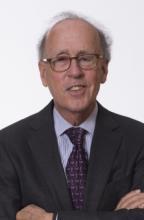The Violence and Settlements Anathema (Part 1/2)
From his first Middle East tour as President Obama's special envoy, George
Mitchell must have found that not much has changed since his 2001 report. During
his previous mission on the origins of the Second Intifada, Mitchell concluded
that ending the Israeli settlement activity and violence are intertwined and
remain the core impediment to meaningful negotiations. Mitchell has also said
that conflicts that are caused by man can be resolved by man, and that
negotiation is the singular most effective tool to solve disputes. His core
beliefs and emphasis on diplomacy will certainly help him tremendously on his
mission, but he may need more than that to pierce through this emotionally and
psychologically laden conflict that has eluded all of his predecessors.
The proposition that if the Palestinians want a state they must foreswear
violence, and if Israel wants peace it must end the occupation, seems logical
and practical though neither logical discourse nor practicality dictate this
long and debilitating conflict. From the Palestinian perspective, ending violent
resistance cannot be mitigated by anything other than ending the settlement
activity and occupation, which are the source of humiliation and deprivation. As
they see it, no Israeli government can do anything to obscure this basic
reality. Many Palestinian moderates agree that acts of violence including firing
rockets into Israel are inexcusable and Israel has the right to defend itself.
But they also insist that the Israeli war on Hamas and future retaliatory
attacks will have no moral sustenance and will not change the core of the
problem as long as Israel fails to address the root-causes of violence in the
first place.
Given that Israel is seen as an occupying power, it has been unable to capture
the moral high ground even in self-defense. Instead of generating sympathy for
being rained on with rockets, it was condemned by the international community
for its incursion into Gaza. Israel might wish to separate Hamas from the
Palestinian civilians, but Hamas' popularity grows in parallel to the settlement
expansion activity, especially in light of the Palestinian Authority's inability
to do anything about it. The Israeli contention that the settlements activity
will not prejudice the final status agreement falls largely on deaf ears as the
Palestinians witness the Israelis' daily encroachment on their land and the
consequent hardships they endure. Calm will last only if there is a visible end
to settlement expansion, even in settlement blocks that Israel is planning to
incorporate into Israel proper by a land swap agreement with the Palestinians.
Otherwise, ceasefires are no more than tactical moves serving immediate and
limited objectives, and renewed violence remains just a matter of time.
From the Israeli stand point, wanton violence against its civilians is
unacceptable under any circumstances. Israelis recall with horror the violence
at the break of the Second Intifada in late 2000 and the more than 110 suicide
bombings that indiscriminately killed and maimed hundreds of innocent civilians.
For most Israelis, the extent of Palestinian violence-especially following the
peace proposals made at Camp David-was indicative of the Palestinians' rejection
not only of any peace formula but of Israel's very existence. All the confidence
building measures taken up through the summer of 2000 were shattered overnight
leaving most Israelis baffled about any real prospect for peace. By making the
cessation of hostilities a precondition to political and territorial
concessions, continued occupation has become synonymous with national security.
Palestinian extremists vowing to destroy Israel have provided it with further
justification for taking extraordinary measures to protect the security of
Israelis. Yet, targeted killings, arrests of would-be terrorists and the
demolition of homes by Israeli security forces have provoked violent reactions
casting a darker cloud on any credible political discourse or territorial
concessions.
Given this uncertain climate, the settlements movement has made significant
inroad into Israel's political establishment, usurping the political agenda
while successive governments have openly supported expansion or the building of
new outposts. Israel's unilateral withdrawal from Gaza and the subsequent use of
the strip as a staging ground for attacks against Israel has disheartened most
Israelis and alienated even the moderate camp. It has further played into the
hands of right wing Israeli extremists who oppose any withdrawal, and deepened
their conviction that peace with the Palestinians remains as illusive as ever.
The Israeli public has reacted to the firing of rockets from Gaza during the
past three years by further shifting to the right; a development that will make
it most likely for Likud leader Benjamin Netanyahu to become the next prime
minister following the February 10th national election.
The Arab moderate states, especially Saudi Arabia, Jordan, Morocco and Egypt,
who have condemned Hamas and tacitly supported Israel's stand against it are
running out of patience. The Arab masses cannot reconcile the death of
Palestinian civilians, especially women and children, with Israel's grievances
about violence when the Palestinians are an occupied people and have an inherit
right to resist. For the vast majority of Arabs, it is an anathema that Israel-a
country presumably seeking peace-has refused to embrace the Arab Peace
Initiative which offers exactly that: a comprehensive peace in exchange for the
territories. Increased Arab militancy and violence are the inadvertent results
steadily eroding the position of the Palestinian moderate camp in favor of
militant confrontation.
This is the climate in which Mr. Mitchell will find himself when he returns to
the region for his Herculean mission. Moreover, he will face a new Israeli prime
minister who will likely be Likud Leader Benjamin Netanyahu-a right of center
leader who staunchly supports the settlements movement. And on the Palestinian
side he may well have to deal with a Fatah-Hamas unity government that will too
take a harder line in the peace negotiations. In addition, Mitchell will have to
bolster and engage with moderate Arab leaders to ensure their direct engagement
and perseverance, while coaxing Syria to enter into direct negotiations with
Israel. This however, will not deter a skilled negotiator like Mitchell as there
is also a silver lining here: both Israelis and Palestinians bestow greater
trust on stronger and more unified governments who don't compromise their
national interests. And the leading Arab states, Saudi Arabia and Egypt, are
eager to see tangible progress on the Palestinian front and are thirsty for a
genuine American active involvement. Damascus too is anxious for a direct
dialogue with Washington.
Mr. Mitchell, with the full support of President Obama and Secretary of State
Clinton can succeed where other administrations have failed. He must come
equipped, however, with carrots and sticks for both sides, remain committed,
actively involved and relentless, and be prepared for the United States to be a
part of a long-term solution.
(This is part one of a two-part analysis on violence and the settlements in
Israel and the Palestinian territories.)
If you wish to comment on this article, you can do so on-line.
Should you wish to publish your own article on the Facts & Arts website, please contact us at info@factsandarts.com.



















